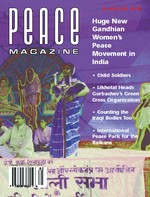
Peace Magazine Jan-Mar 2004, page 29. Some rights reserved.
Search for other articles by James Applegate here
Jonathan Barker, Toronto: New Internationalist Press and Between the Lines, 2003. 144 pp. $15.00
As with countless others, September 11th changed the focus of Jonathan Barker's life. Barker, a political scientist at the University of Toronto, had been researching democracy in the lives of marginalized people, such as peasant farmers, street vendors, and refugees. But the terrorist attacks forced him to take a long hard look at the "ugly side" of politics.
The result is The No-Nonsense Guide to Terrorism--a short, yet powerful book. It asks the right questions, comes up with plausible answers, and gives us tools to develop our own analysis. Overall, this slim volume gives us a far broader perspective than most of the trendy works that came flooding out after the 2001 attacks.
How About A War Against Rabies?
One theme is that many people can't think clearly about terrorism. Feeling threatened, they retreat into the moral community with which they identify. But it is not only George W. Bush who simplifies the world into nations that are "with us or against us." Respected journalists such as the Globe and Mail's Marcus Gee, and terrorism experts also fall into the trap of righteousness, effectively reducing political discussion to: "we're good, they're evil."
The No-Nonsense Guide effectively asserts that moralism prevents analysis of the real questions: Under what conditions do human beings adopt terrorism? Can terrorism ever be justified? What are the most effective responses to terrorist acts?
A second theme is balancing the risk of terrorism with the risk of wrecking democracy by trampling on civil liberties. Here, we are surprised to learn that terrorism is relatively rare. Citing statistics, Barker states that terrorist attacks are "well down on the list of the dangers people face, somewhere between bee stings and lightning strikes as a cause of death." When we find that many more people die from rabies than terrorism, we pause to ask: "Well then, why don't we have a ´War on Rabies?'"
As for the risk to democracy, Barker describes how many governments have restricted civil liberties since September 11th, then worries that these new laws may harm popular politics and activism worldwide. Citing Zimbabwe, Russia, and Israel, he describes how governments use the "war on terror" to give more legitimacy to their own repressive policies or political violence.
In a historical overview going back to Biblical times, Barker argues convincingly that governments are actually the world's most frightening terrorists. Owing to its superior power, the state can mobilize more violence against its own or neighboring citizens, as seen in the Inquisition, the French Revolution, Hitler's Germany, Stalin's Soviet Union, a host of Latin American nations and, more recently, Rwanda.
As for why people turn to terrorism, President Bush may believe that terrorists attack because they hate principles like "freedom and democracy." But Barker contends that violence is rooted back in local contexts and conflicts. He also insists that psychology is a second critical factor.
"In itself poverty rarely imparts the emotional energy that is evident in acts of terrorism," Barker writes. "The springs of terrorism lie rather in a sense of humiliation, degradation and disrespect."
Toward the end of The No-Nonsense Guide, Barker rejects the current "war on terror" as counterproductive. He believes that the war mentality casts terrorists in the role of heroic warriors (at least to sympathizers), converts others to their cause, and diverts resources away from global problems.
Barker's alternative would be to treat terrorism as a "crime against humanity," with terrorists now cast in the role of lowly criminals. Enforcement becomes the work of police, intelligence forces, and the justice system. But beyond this, states need to create opportunities for people with political grievances to engage in bargaining and negotiation. And further, they need to address underlying issues such as poverty. While promising, this section is disappointingly short, needing more arguments and case studies to show how this vision might work.
Barker skillfully ends The No-Nonsense Guide to Terrorism by issuing a triple challenge to readers: We need to create an effective response to terrorism while preserving democratic freedoms and working on the world's urgent problems, such as poverty, environmental degradation, and arms control.
Reviewed by James Applegate, a Vancouver writer with a special interest in war, peace and the environment.

Peace Magazine Jan-Mar 2004, page 29. Some rights reserved.
Search for other articles by James Applegate here